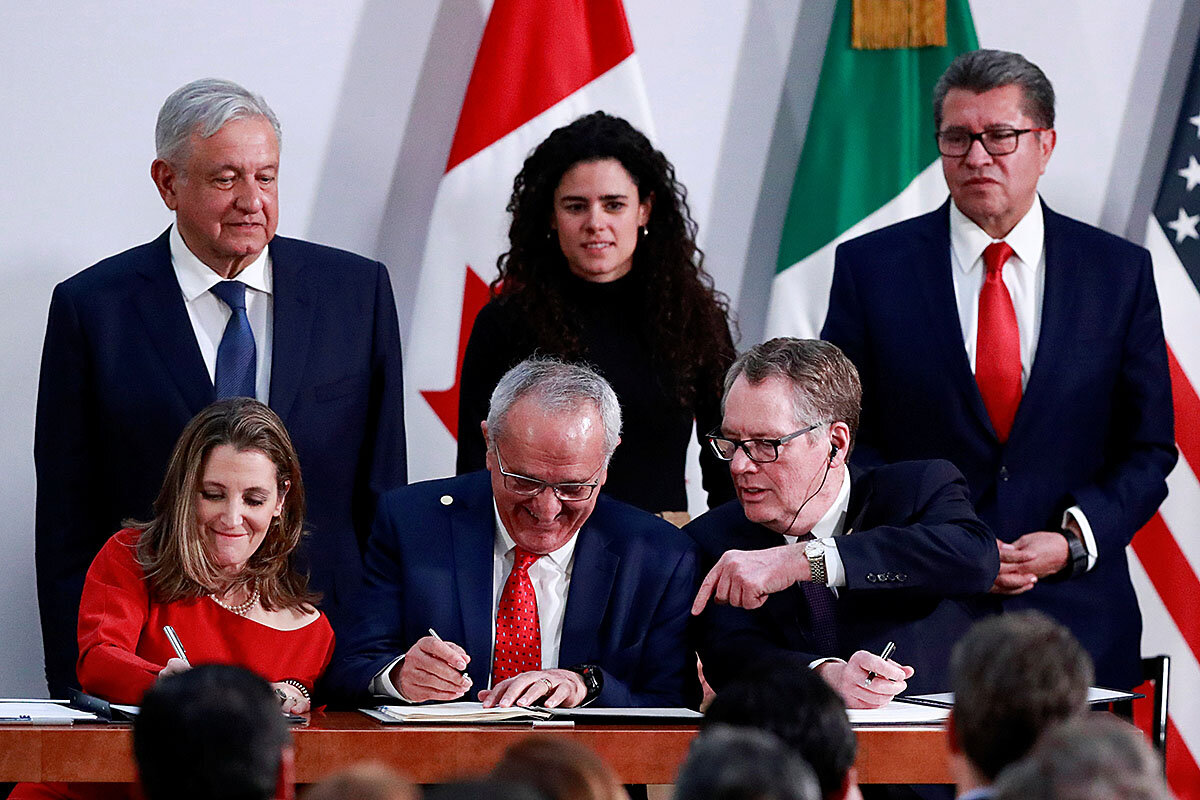How impeachment helped push surprise progress on trade
| Washington
Suddenly, Washington is getting things done in bipartisan fashion. And that’s in spite of – or perhaps because of – the thoroughly partisan effort to impeach President Donald Trump.
Democrats and Republicans, in Congress and the White House, are under pressure to show accomplishments as a politically tumultuous year draws to a close and the 2020 election cycle ramps up.
Now, as the dust settles following a day of big news, there seems to be something for almost everybody: House Democrats have unveiled two articles of impeachment against President Trump, charging him with abuse of power and obstruction of Congress over his dealings with Ukraine. And bipartisan agreement has been reached on two major pieces of legislation, a new U.S.-Mexico-Canada trade agreement and the largest defense funding bill in American history.
Why We Wrote This
Agreement on a new trade deal and a defense authorization bill show bipartisan progress is possible even amidst the polarizing effects of the impeachment inquiry.
If nothing else, the two major bipartisan agreements could help alleviate Americans’ growing sense that national institutions, including the federal government, are failing them.
The trade deal, which replaces the North American Free Trade Agreement, or NAFTA, hands President Trump bragging rights on one of his signature campaign issues – an issue that speaks directly to blue-collar workers, many of whom abandoned the Democratic Party in 2016 and voted for Mr. Trump.
But to some political analysts, it’s a risk Democratic House Speaker Nancy Pelosi had to take. And, they add, in the process she won concessions on matters dear to the labor movement.
“The danger for Democrats in giving Trump an accomplishment is real, but at the same time, it’s good to see that in the midst of impeachment, we can get something done,” says Jeremy Mayer, an associate professor of policy and government at George Mason University in Fairfax, Virginia.
If the effort to replace NAFTA had failed, Mr. Trump would have showered blame on House Democrats. Instead, Speaker Pelosi and AFL-CIO President Richard Trumka, head of the nation’s largest labor federation, used their leverage to add key provisions to the agreement, known as USMCA.
Democratic demands for change centered on enforcement, labor and environmental protections, and a drug pricing provision. Protections for so-called biologic drugs, which would have kept prices high, were removed. New rules were also added on intellectual property and data. The White House has yet to release the latest version of the agreement.
Some liberals and conservatives expressed displeasure with the deal – defections that are unsurprising at a time of intense political division. For dissonant liberals, the idea of handing Mr. Trump a major legislative victory makes no sense. For some conservatives, such as Republican Sen. Pat Toomey of Pennsylvania, the deal gave away too much to the left. But with the Pelosi-Trump seal of approval, it’s expected to pass both houses of Congress early next year.
“The conventional wisdom is, you don’t want to give the president a big win in an election year,” says Patrick Griffin, director of legislative affairs under President Bill Clinton. “But there are mitigating circumstances here that do not make this the end of the world.”
Those circumstances, Mr. Griffin adds, are impeachment and the fact that the 2020 election is still light years away, politically speaking. For Ms. Pelosi, the trade deal gives needed cover to moderate Democrats fighting to hold on to House seats in battleground districts that may not love the idea of impeaching Mr. Trump.
Ms. Pelosi herself seems to have no qualms about the negotiations that produced the USMCA deal. “We ate their lunch,” she told fellow House Democrats behind closed doors Tuesday, according to multiple news reports.
Late Monday evening, the week’s first major moment of bipartisan compromise emerged, when congressional Democrats and Republicans announced agreement on the National Defense Authorization Act of 2020. Among its provisions, the bill fulfills Mr. Trump’s oft-discussed goal of establishing the Space Force as the sixth military branch. (The Space Force will be within the Air Force, as the Marines are within the Navy.) It also provides 12 weeks of paid parental leave for all federal workers, a long-sought Democratic goal, and a 3.1% raise for troops, the largest pay hike in a decade.
Fiscal conservatives expressed dismay over the cost of the defense bill – $738 billion, as the annual federal deficit tops $1 trillion – but voices of restraint on spending are a distinct minority in the Trump era.
Top of mind at the moment are impeachment and political jockeying ahead of the 2020 elections. The USCMA trade deal could make a difference with voters in states that Mr. Trump won narrowly in 2016 – Wisconsin, Michigan, and Pennsylvania – as well as states he narrowly lost but hopes to win in 2020, such as Minnesota.
In rural Minnesota, as elsewhere in rural America, many workers feel they’ve lost jobs unfairly due to foreign competition.
“The new trade deal helps Trump with those voters,” says Steven Schier, a political scientist at Carleton College in Northfield, Minnesota. “And those voters are essential for his victory in swing states.”








